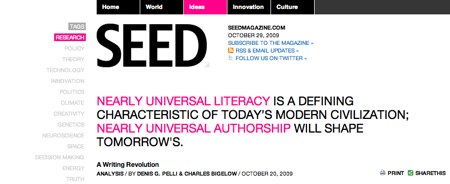Universal Authorship
Dennis Pelli and Charles Bigelow observe that authorship is becoming nearly universal.
Concern for the minority who can’t read may soon extend to those who can’t publish. Reading—a defining characteristic of civilization as far back as ancient Greece when all Athenian citizens were expected to know how to read—is now taken for granted in industrialized democracies. Publishing by the few Athenian authors brought us drama, philosophy, science, mathematics, literature, and history. As readers, we consume. As authors, we create. Our society is changing from consumers to creators.
Is universal authorship really a good thing? Sure, it allows easier access to information and personal experience, but doesn’t that just mean we’ll have to wade through a waist-deep ocean of cheese sandwiches before finding what we’re really looking for? Perhaps. But since search capabilities have been keeping up with the increase so far, perhaps the search engines will put in the money and effort to stay on top of it. In any case, links placed by thoughtful writers will continue to provide a trail for interested readers.

